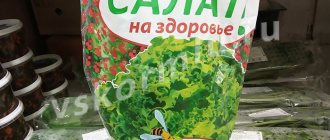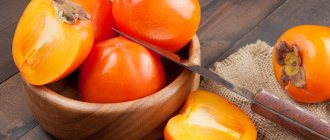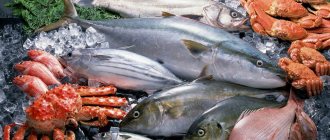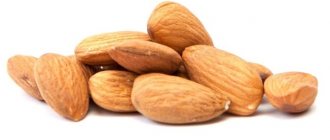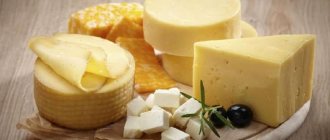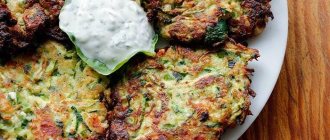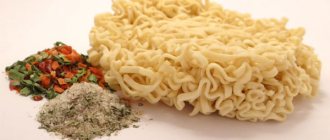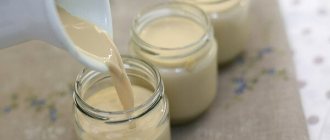How to avoid allergies and not provoke colic
Before your baby turns one month old, you should purchase fruit according to the following principles:
- Color range: do not eat red and orange fruits. The pigment present in their composition can cause an allergic reaction - spots, itching. The exception is a red apple, but it must be peeled.
- By type: no citrus fruits. The vitamin C content allows them to be called allergy provocateurs.
- Effect on intestinal microflora: pear, plum, grapes. They can cause bloating and flatulence. Plum can cause a laxative effect, which is strictly unacceptable for the body of a small child during feeding. At the same time, in case of constipation in an adult or a child, draining can be a means of relief.
We give preference to local fruits
Attractive in appearance and taste (pineapple, mango, papaya) and citrus fruits can only bring pleasure in terms of taste, but can cause harm due to their origin. The only thing you can afford are bananas, which are affordable in terms of price, and they do not cause any harm to the body.
It is worth giving preference to apples grown in your own garden, since the human body assimilates fruits that were grown on the territory of residence much better.
But don't give up exotic fruits. You need to approach their choice wisely. It is through mother's milk that the child becomes familiar with all the components of food. This will allow you to introduce fruits into your baby’s complementary foods, which will be easier for the body to accept much more easily. In addition, a woman's milk will soften the reaction that may be caused by allergies.
Exotic fruits that are brought to us from distant countries are treated with chemicals to ensure their safety. When eating the fruit, it is better to allow yourself a small piece and not in the first months of the child’s life. The peel accumulates toxins, and therefore it needs to be removed, and the fruit itself should be washed with water and a solution of baking soda.
Be sure to buy seasonal fruits
Experts believe that the right decision is to buy seasonal fruits. They are able to provide the body with vitamins, and the taste during natural ripening is much more pleasant. A nursing mother must remember or write down a list of seasonal fruits that are safe to eat:
- White and yellow cherries. Can be consumed from early May to late August;
- Red and black currants. It contains a high concentration of vitamin C, which allows it to be classified as a product that can cause allergies. As soon as the child turns three months old, you can allow yourself to drink currant fruit drinks, and also feel free to eat berries;
- From mid-July to the end of September you can enjoy nectarines and peaches. They contain silicon, which helps improve metabolic processes in the body. To begin with, it is better to try a couple of pieces and see if there is any reaction on the child’s body;
- From the beginning of June to the end of September you can buy and eat figs. It is characterized by the effect of reducing heat. It is a true salvation for the immune system, especially when a nursing mother must use a minimum of medications;
- From October to December, you can allow persimmon to be introduced into your diet (after three months of life), which helps increase hemoglobin and is a source of iodine. It is highly not recommended as complementary food, since due to its viscosity it will not be fully processed by the baby’s intestines, which are inexperienced in terms of food;
- From September to the end of December you can buy pomegranate, which contains a high concentration of iron. You can drink pomegranate juice, which must be diluted with water. The only caveat is that the child must be one month old, and the permissible portion is no more than 30 ml.
Top 9 reasons to eat fruits during breastfeeding
Juicy, tasty, sweet, favorite fruits bring a lot of benefits, namely:
- strengthen the immunity of women and children by increasing the level of hemoglobin in the body due to the iron supplied with food;
- support the health of the skeletal system during lactation due to the high calcium content;
- support the health of the heart muscle due to the presence of potassium;
- improve blood circulation in the brain, have a positive effect on the functioning of the nervous system, as they contain B vitamins, as well as folic acid;
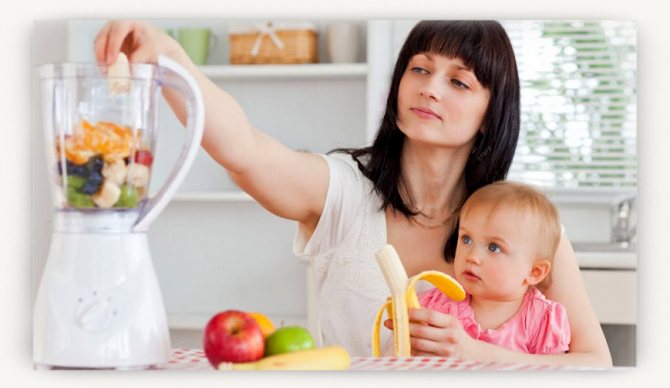
- have a beneficial effect on the functioning of the muscular system and prevent the occurrence of cramps due to the magnesium content;
- reduce cholesterol levels in the blood and improve metabolic processes, which, among other things, help normalize weight. And all this is thanks to the pectin content in the fruits;
- minimize the risk of developing vision problems due to the presence of phosphorus in them. The latter, by the way, also supports the health of the skeletal system;
- normalize stool due to fiber content.
Finally, they improve the mood of nursing newborns, because, contrary to existing rules and prohibitions, they allow them to safely saturate their bodies with treats.
Proper introduction of fruits into the diet
A nursing mother should gradually introduce new fruits and juices into her daily diet. It is advisable to adhere to the rule - no more than one new product every three days. You can allow a small dose in the first half of the day, and a possible allergy reaction in the baby may appear in the evening. If you notice spots or rashes on the skin, you must avoid eating this fruit, keeping a pause for about a month, after which you can try it again. A woman should remember the slow maturation of the baby’s digestive tract, as a result of which easy adaptation to a new product occurs. If the test was adequate, you can eat 200-300 grams of fruit.
A woman should be aware of her own body’s reaction to the product. If rejection was observed before pregnancy, then there is no need to be guided by its beneficial properties, trying to force yourself to eat.
It is important to realize that each baby is unique and the body's reaction can be unpredictable. Some children can easily accept raspberries or currants, while the skin of others will break out in a rash from a harmless pear. In any case, a woman should follow general recommendations, since severe allergies that a child suffered in childhood can cause skin and respiratory diseases. Thus, you need to understand which fruits are allowed and which should not be consumed under any circumstances.
We present to your attention a list that every nursing mother should look through before going to the store.
Standards of use
Even to approved products, a child may have a negative reaction if they are abused. Therefore, a nursing woman should know the daily intake of different fruits and not exceed it.
| Fruits | Daily consumption rate, in grams |
| Apples, pears, peaches | 100 |
| Apricots | 150 |
| Bananas, plums and persimmons | 200 |
| Dried fruits | 100 |
A young mother is allowed to eat from 350 to 400 grams of various fruits per day. Fruits should be included in the diet carefully, taking into account the child’s reaction, gradually increasing the serving size. It is not recommended to introduce 2-3 types of fruit into the menu in one day.
Fruits allowed during breastfeeding
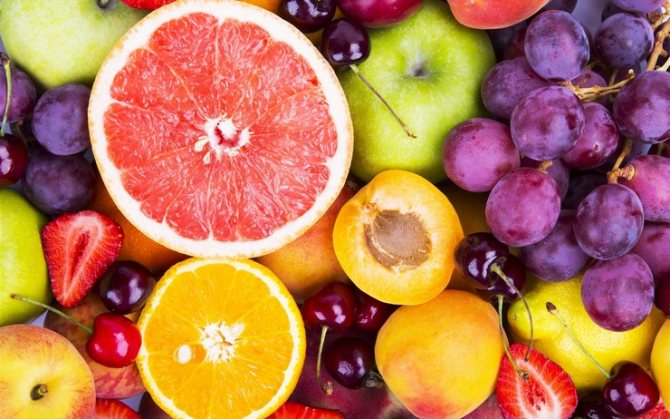
Apples. They contain fiber, iron, calcium, magnesium and iodine. They are able to restore vitality and make you feel cheerful and energized. It is best to give preference to green apples, but if you stick to moderation, all varieties are fine. Apples should be eaten without peeling, or even better, after pre-baking in the microwave (2-3 minutes) to avoid gas formation in the child.
Pears. A real gift for a woman who is breastfeeding, as they contain folic acid, fiber, and various vitamins. It is necessary to remove the peel to avoid colic in the baby.
Peaches. They contain magnesium, which is an excellent antidepressant, which will improve your mood and provide protection in stressful situations. They can be called a product for the full development of a child’s brain.
Apricot. Contains vitamins and microelements. The optimal product to ensure harmonious functioning of the immune system.
Watermelon. Helps increase milk supply in a woman and improve metabolism. The only caveat is that most fruits are grown with the help of chemicals, which is why it is worth consuming them in a certain season and in small quantities.
Plums. If a woman or baby suffers from constipation, you should turn to this fruit. The most important thing is not to abuse it. Baby food departments contain a wide range of prune purees.
Bananas. They contain a large amount of potassium, which causes the production of serotonin, which is called the real hormone of joy. It can be used as an excellent snack to restore strength.
Berries - cherries, sweet cherries, gooseberries, raspberries.
They can be called a storehouse of antioxidants that do not provoke an allergic reaction in a child. Vitamin C, which the berries are rich in, will provide protection against colds.
What can you eat and when?
Fruits and berries are generally safe from the very beginning of breastfeeding. But at the very beginning of breastfeeding, special care is required. Many children in the first months of life cannot tolerate certain foods in their mother’s diet. This is due to the immaturity of the gastrointestinal tract. Each child is individual and develops at different rates. That is why there is no single feeding recipe that is guaranteed to save a baby from tummy problems. Fruits cause a mixed reaction: some children (even newborns) tolerate any fruit well, others develop colic almost after all.
During breastfeeding you can eat: apples and pears, currants and gooseberries, peaches and apricots, raspberries and blackberries, blueberries and cranberries, grapes. But literally everything is in small quantities. When it comes to exotic fruits, bananas are the only allowed option.
- Blueberries are one of the most desirable berries in the diet of a nursing mother. This is a real natural storehouse of nutrients. The antioxidant properties of blueberries protect the baby from infections and saturate them with vitamins A and K, calcium, potassium and carbohydrates.
- Apples are rich in calcium, iron, iodine, magnesium, potassium, phosphorus, folic acid, vitamins A and C. During pregnancy, the level of iron in a woman’s body decreases. But during lactation the need for this substance only increases. It is equally important to promptly replenish calcium reserves, the deficiency of which weakens bones and reduces breast milk production. A nursing mother also has an increased need for liquid, which apples are also rich in. The fruits have a mild laxative effect, and to prevent your baby from developing gas, eat them without the skin, fresh or baked.
- Bananas are an excellent source of folic acid and other vitamins and minerals your baby needs. They help replenish the calories that mothers lose during breastfeeding and saturate them with potassium, which normalizes the water-salt balance in the body.
- Raspberries, blackberries and other seasonal berries have high levels of potassium, vitamin C, folate and fiber, as well as natural antioxidants that have anti-inflammatory and anti-cancer powers. This is an effective prevention of colds.
- Peaches and apricots have a beneficial effect on the mother’s nervous system, protecting her from stress, improving her mood, which also has a positive effect on the condition of the baby - there are fewer whims and tears. These stone fruits boast impressive amounts of immune-strengthening beta-carotene. And their low calorie content helps mothers control their weight after childbirth.
- Cranberries are a storehouse of vitamin C (ascorbic acid). Drinks based on this berry perfectly quench your thirst in the summer heat and lift your spirits. Noticeably increases lactation. A valuable complex of vitamins and minerals protects the new mother from postpartum depression. The calcium contained in berries improves the condition of hair and nails. Makes breast milk higher quality and healthier for the baby. Practically does not cause allergies in the child. Cranberries are contraindicated for gastritis and stomach ulcers.
Is it possible to eat persimmons while breastfeeding?
Having water-soluble vitamin C in the diet is vital for a breastfeeding woman and her baby. It has antibacterial, tonic, antipyretic and restorative properties. The human body is not capable of synthesizing this substance, so both mothers and babies must receive it with their diet.
It is advisable to form a fruit basket based on the recommendations of experts. For a breastfeeding woman aged 19 to 50 years, the recommended daily intake of vitamin C is 85 mg per day. Fresh fruits and berries are a great way to get the norm without additional intake of vitamin complexes. But even here you need to know when to stop - excess ascorbic acid in breast milk can cause diaper rash in babies.
Fruits that are not advisable to eat in the first 3 months
Exotic fruits - mango, kiwi, pineapple, papaya, feijoa. They can provoke an allergy reaction in a baby. Kiwis contain vitamin E, which promotes the removal of toxins and ensures the functioning of the gastrointestinal tract. Moreover, such a harmless fruit will prevent the occurrence of cancer. Exotic fruits have a pleasant taste and an abundance of vitamins, but they should not be overused. When the baby turns 4 months old, you can eat one fruit at a time. If there is no reaction, you can eat safely.
Citrus fruits - lemon, lime, grapefruit, orange, tangerine. Strong allergens, they can be consumed when the baby is 4 months old. It is worth paying attention to pomelo, the use of which causes the least risk of developing allergies.
Grape. Ensures the development of the skeletal system thanks to minerals and vitamins. The only thing is that it can lead to bloating in the child, so it should not be abused.
Berries – strawberries, sea buckthorn, raspberries, wild strawberries. It should be used with caution as it may cause allergies.
Nursing mothers are required to eat a lot of fruits in order to provide both their body and the child’s body with useful microelements. This will contribute to the harmonious development of the baby and increase the vitality of the woman herself. The most important thing is the absence of abuse when including fruits in the daily diet.
List of healthy fruits for a nursing mother
The list of healthy fruits for a nursing mother is quite diverse. It is best to choose fruits that grow in your area of residence. But this is not always possible. When compiling a diet, you need to take into account individual indications, namely, the presence of any diseases in the mother or baby, the age of the baby, and the season of the year.
In the first month after birth
You need to be especially strict when choosing fruits in the first month after giving birth. In a newly born baby, the digestive system cannot yet function fully. It will take time to “populate” the intestines with beneficial bacteria.
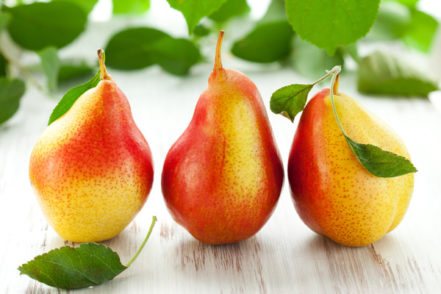
Therefore, you need to choose hypoallergenic fruits that do not cause fermentation.
- Bananas . These fruits can be eaten even in the maternity hospital, but, of course, not in kilograms. First, you can afford a quarter of the fruit. If after this the baby does not have a negative reaction, you can eat 1-2 medium bananas per day. This fruit saturates the body with potassium, stimulates the digestive tract, and normalizes sleep.
- Apples . These fruits contain a lot of useful microelements and vitamins. Apples should be selected with green or yellowish peel; red fruits should not be eaten during this period. You should start with baked apples, then you can eat raw fruits.
- Pears . This type of fruit is especially beneficial if the mother or baby is constipated. Pears should be eaten peeled. Pears can be baked in the oven, just like apples.
Forbidden fruits
Let's summarize the main restrictions on fruit consumption while breastfeeding:
- You should choose fruits and vegetables that do not contribute to gas formation. These are too sweet (grapes), with a high content of plant fiber (dried fruits, white cabbage). Excessive quantities of plant foods have the same negative effect.
- Fruits that are unusual for our stomachs - papaya, mango, pineapple, lychee and many others - are best left for the period when the breastfeeding period ends. Exotics are unpredictable, and it is better not to risk the health of your own child.
- Nursing mothers who are afraid of constipation should remove persimmon from their diet. Pears can also cause this reaction.
The period of breastfeeding is not the time for experiments, so it is better for the mother to adhere to the recommended diet.


